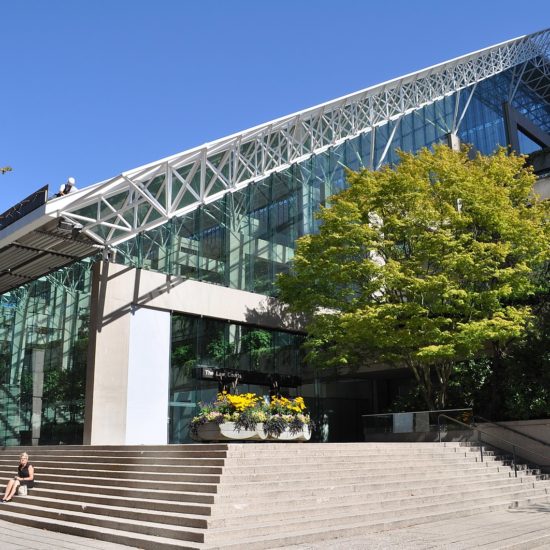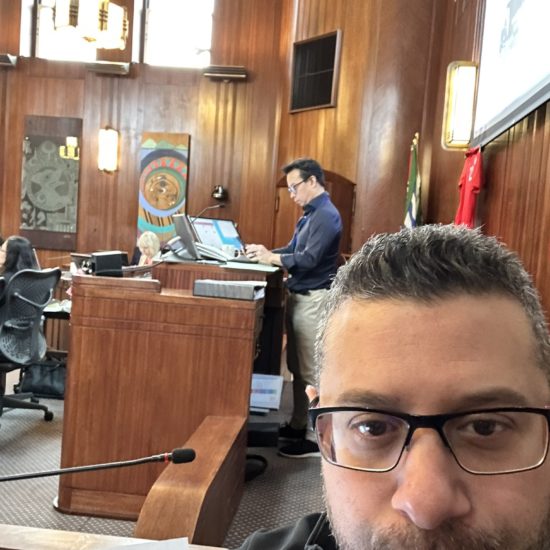
Bob Mackin
What do the Mayor of Vancouver and the CEOs of TransLink and the Vancouver International Airport Authority have in common?
They are all taking pay cuts in the wake of the coronavirus recession.

TransLink’s Kevin Desmond (left), Mayor Kennedy Stewart and YVR’s Craig Richmond.
After his first attempt at a $200 million bailout from the provincial government went nowhere, Stewart, whose salary is $178,265 this year, proposed a 10% pay cut for all members of city council. It passed on May 12.
Ten percent is also the amount that non-union staff are losing from their paycheques under furloughs lasting until December.
TransLink CEO Kevin Desmond pleaded for provincial help, too, claiming $75 million in losses per month in Metro Vancouver’s multimodal public transit system after the stay home order cut ridership by 80%.
Some 1,500 bus drivers were laid-off, but they are now being recalled and TransLink will begin charging bus fares again on June 1. The province has come to the rescue, but the terms of the bailout have not been released. Desmond, who was paid $405,242 in 2018, is taking a 10% pay cut, along with senior executives and board members.
“Everything is being reviewed right now in light of the agreement with the Province announced last week. Nothing has changed and the salary reduction remains in place,” said TransLink spokeswoman Jillian Drews.
Vancouver International Airport laid-off a quarter of its 550 staff and said May 11 that it is forecasting the passenger count to decline from 26 million annually to as low as 8 million passengers during each of the next three years.
At YVR, spokesman Brock Penner said the board and executive have taken 10% reductions in pay.
The airport authority does not release executive salaries, but the most-recent annual report said CEO Craig Richmond is paid between $388,000 and $582,000 and the nine vice-presidents $188,000 to $282,000 each. The 13 board members received between $19,250 and $76,800 in 2018, with the chair maxing out at $175,000. (The retiring Richmond will be replaced July 1 when Tamara Vrooman leaves Vancity Credit Union and is promoted from the YVR board to the CEO suite.)
So what about other high-earners in B.C.’s public sector? MLAs already set the tone, by delaying indefinitely their statutory cost of living increase.
On April 20, theBreaker.news sent a questionnaire to seven of B.C.’s highest-paid public sector CEOs. It cited New Zealand Prime Minister Jacinda Ardern, who slashed her own pay by 20% and ordered her cabinet and Crown corporation CEOs to do the same.
Not one of the big bucks B.C. bosses replied.
Who are they and what are their total pay packets for the most-recent fiscal year reported (2018)?
University of B.C. president Santa Ono ($601,772) and BC Hydro CEO Chris O’Riley ($554,900) topped the list, that also included: ICBC’s Nicolas Jimenez ($468,783); B.C. Pavilion Corporation’s Ken Cretney ($472,951); B.C. Lottery Corp.’s Jim Lightbody ($411,084); Deputy Minister and head of the Public Service Don Wright ($357,501); and Liquor Distribution Branch’s Blain Lawson ($267,420).

Clockwise from upper left: Don Wright (BC Public Service), Chris O’Riley (BC Hydro), Santa Ono (UBC), Greg Moore (BCLC), Blain Lawson (LDB), Nicolas Jimenez (ICBC) and Ken Cretney (PavCo)
The questions were simple.
Would they voluntarily and temporarily reduce their pay? Had their organization pondered layoffs or furloughs?
There was a reply from Duncan Blomfield, the spokesman for Cretney and PavCo. Since the World Health Organization declared a pandemic on March 11, a cascade of cancellations at B.C. Place Stadium and the Vancouver Convention Centre. The only new booking was at the convention centre’s west complex, where a field hospital was set-up.
“As you can appreciate, it is a difficult time for our organization, and for the entire meetings and events sectors,” Blomfield wrote in an email. “We are looking at all options to take care of our people and the viability of our business, while working closely with our government about appropriate next steps. When there is new information to share, we will do so.”
Support theBreaker.news for as low as $2 a month on Patreon. Find out how. Click here.
- Looking for information on how to keep yourself and others healthy amid the coronavirus pandemic? Do you have symptoms? Click here for all you need to know, from HealthLinkBC.











